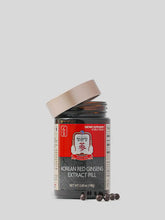The Role of Adaptogens in Modern Stress Management
‘In our fast-paced modern world, stress has become a common companion. Balancing work, family, personal goals, and unexpected life challenges can quickly lead to feeling overwhelmed. While stress is a natural response, chronic stress can take a toll on our physical and mental health, leaving many searching for effective solutions.
One growing area of interest is the use of adaptogens—natural substances known for their ability to help the body adapt to stress. Among the most famous adaptogens is ginseng, particularly Panax Ginseng, a key offering from JungKwanJang, known for its centuries-old expertise in herbal remedies.
This article explores the role of adaptogens like ginseng and ashwagandha in modern stress management and highlights how these herbs can support overall well-being.
What Are Adaptogens?
Adaptogens are natural substances, often derived from plants or mushrooms, that help the body cope with stress. They work by supporting the adrenal system, regulating cortisol levels, and boosting overall resilience to stressors. Unlike some short-term solutions for stress relief, adaptogens promote long-term balance, making them a popular choice for those seeking holistic well-being.
Adaptogens have been used for centuries in traditional medicines like Ayurveda, Traditional Chinese Medicine (TCM), and Korean herbal practices. Their modern popularity is growing as more people turn to natural remedies for stress relief.
The Science Behind Adaptogens
Adaptogens are unique in that they help the body achieve homeostasis, or balance, by interacting with the hypothalamic-pituitary-adrenal (HPA) axis. This system is responsible for controlling the body’s response to stress. When the body encounters a stressor, the HPA axis triggers the release of stress hormones like cortisol. Over time, chronic activation of the HPA axis due to prolonged stress can lead to fatigue, anxiety, and even physical ailments like high blood pressure.
Adaptogens, such as Panax Ginseng and ashwagandha, help to regulate the HPA axis and modulate the body’s stress response. By supporting adrenal health, adaptogens can promote a balanced cortisol response, which helps reduce feelings of stress and improves resilience.
How Ginseng Supports Stress Management
One of the most widely researched adaptogens is Panax Ginseng, commonly known as Korean Red Ginseng. JungKwanJang, with its over 100 years of experience, has perfected the cultivation and preparation of this time-honored herb, which is known for its numerous health benefits.
Benefits Of Ginseng For Stress Relief
1. Improves Mental Clarity and Focus
Ginseng has been shown to improve cognitive function and mental clarity, particularly in times of stress. By enhancing brain function and reducing mental fatigue, ginseng helps individuals stay focused and productive during stressful situations.
2. Balances Energy Levels
Unlike stimulants that cause an energy spike followed by a crash, ginseng supports steady energy levels. This helps to prevent burnout and promotes sustained energy, which is crucial when managing long-term stress.
3. Boosts Immune Function
Chronic stress weakens the immune system, making individuals more susceptible to illness. Ginseng helps strengthen the immune response, which can counteract the negative effects of stress on overall health.
4. Reduces Anxiety and Depression
Studies have found that ginseng may help reduce anxiety and symptoms of depression, both of which can be exacerbated by stress. By promoting a balanced mood, ginseng supports mental and emotional well-being.
5. Enhances Physical Endurance
Physical symptoms of stress can include fatigue, muscle tension, and a weakened physical state. Ginseng has been shown to improve physical stamina and endurance, making it easier for individuals to manage the physical effects of stress.
Other Key Adaptogens in Stress Management
While Panax Ginseng is a standout adaptogen, other herbs like ashwagandha and Rhodiola rosea also play an important role in managing stress.
Ashwagandha: The Ayurvedic Adaptogen
Ashwagandha, a staple in Ayurvedic medicine, has been used for centuries to support stress relief and promote relaxation. Known for its calming properties, ashwagandha helps reduce cortisol levels and promotes a balanced response to stress. Some studies have shown that ashwagandha can help reduce anxiety, improve sleep quality, and even support cognitive function.
Rhodiola Rosea: Stress and Fatigue Fighter
Rhodiola rosea is another adaptogen that has gained popularity for its ability to reduce stress-related fatigue. This herb works by boosting endurance, reducing feelings of exhaustion, and improving mental resilience. It’s particularly effective for those who feel worn out by chronic stress or are experiencing burnout.
How to Incorporate Adaptogens into Your Daily Routine
Incorporating adaptogens like ginseng and ashwagandha into your daily routine can be a natural and effective way to support stress management. Here are a few tips:
1. Choose High-Quality Products
When it comes to herbal supplements, quality matters. JungKwanJang offers premium, carefully sourced Panax Ginseng that undergoes a meticulous selection process to ensure the highest potency and effectiveness. Opt for trusted brands that prioritize purity and sustainability.
2. Start with a Low Dose
Adaptogens are powerful, but it’s important to start with a low dose and gradually increase as needed. This allows your body to adjust and respond to the benefits over time.
3. Be Consistent
Adaptogens work best when taken regularly over time. Consistency is key to building resilience and reaping the long-term benefits of stress reduction.
4. Pair with a Healthy Lifestyle
While adaptogens can be a helpful tool in stress management, they work best when paired with a healthy lifestyle. Regular exercise, proper sleep, and a balanced diet are essential for overall well-being and stress resilience.
Addressing Modern Stress with Ancient Wisdom
As stress continues to affect millions globally, adaptogens offer a time-tested solution rooted in ancient herbal practices. By enhancing the body’s natural ability to cope with stress, adaptogens like Panax Ginseng and ashwagandha provide a holistic approach to mental, emotional, and physical well-being.
JungKwanJang, as a leading purveyor of Panax Ginseng, brings over a century of expertise in herbal medicine. Their commitment to quality and tradition ensures that every product is crafted with care, offering customers the best possible support for stress management.
What to Look for in Adaptogen Products
When selecting adaptogen products, it’s essential to choose from reputable brands that prioritize quality and sustainability. Look for products that:
- Are sourced from trusted suppliers with a history of excellence, like JungKwanJang.
- Use clinically researched ingredients with proven efficacy.
- Offer transparency in ingredient sourcing and processing.
JungKwanJang's ginseng products are a great example of quality you can trust. Their meticulous growing, harvesting, and preparation process ensures that you receive the full benefits of this powerful adaptogen.
Frequently Asked Questions (FAQs) About Adaptogens And Stress Management
1. What are the most common adaptogens used for stress relief?
The most common adaptogens used for stress relief include Panax Ginseng, ashwagandha, Rhodiola rosea, holy basil, and Schisandra. Each adaptogen has unique properties, but they all help the body regulate its response to stress.
2. How long does it take to see the effects of adaptogens?
The effects of adaptogens can vary from person to person. Some individuals may notice improvements in their stress levels and energy within a few days to a week, while others may need several weeks of consistent use before seeing significant results.
3. Can I take more than one adaptogen at a time?
Yes, many people combine adaptogens to create a tailored approach to stress management. However, it’s important to consult with a healthcare provider before combining different adaptogens to ensure they are right for your needs and do not cause unwanted interactions.
4. Are adaptogens safe for long-term use?
Adaptogens are generally considered safe for long-term use when taken as recommended. However, as with any supplement, it’s advisable to check with a healthcare provider to ensure that long-term use aligns with your overall health plan.
5. Can adaptogens help with sleep?
Yes, certain adaptogens, such as ashwagandha and holy basil, are known to help with sleep by calming the nervous system and reducing anxiety, which can contribute to better sleep quality.
6. Are there any side effects of taking adaptogens?
Most adaptogens are well-tolerated, but some individuals may experience mild side effects like digestive upset, headaches, or changes in blood pressure. If any adverse effects occur, it’s best to stop using the product and consult a healthcare professional.
7. Can adaptogens replace medications for stress or anxiety?
Adaptogens should not be used as a replacement for prescribed medications unless advised by a healthcare provider. They can be used as a complementary approach to managing stress, but it’s essential to discuss any changes in your healthcare routine with a medical professional.
8. Are adaptogens suitable for everyone?
Adaptogens are generally safe for most people, but they may not be suitable for everyone, such as pregnant or breastfeeding women, individuals with certain medical conditions, or those taking specific medications. Always consult with a healthcare provider before starting any adaptogen regimen.
9. Do adaptogens interact with caffeine or other stimulants?
Adaptogens can be taken alongside caffeine or other stimulants, but they may amplify or alter the effects. For instance, combining adaptogens like Panax Ginseng with caffeine may increase alertness without the jitteriness that caffeine alone can sometimes cause. However, individual reactions vary, so it’s important to monitor how your body responds.
10. What form of adaptogens is the best?
Adaptogens come in many forms, including powders, capsules, teas, and tinctures. The best form depends on personal preference and lifestyle. For example, some people prefer the convenience of capsules, while others enjoy incorporating adaptogenic powders into smoothies or drinks.
Embrace The Power Of Adaptogens For Stress Relief
In a world where stress is a constant companion, finding effective ways to manage it is essential. Adaptogens like Panax Ginseng and ashwagandha offer a natural, sustainable approach to stress management, helping the body adapt and thrive under pressure.
With over a century of experience, JungKwanJang stands at the forefront of adaptogen-based wellness, providing high-quality ginseng products that support health, vitality, and stress resilience. Whether you’re new to adaptogens or looking to deepen your practice, consider incorporating ginseng into your routine for long-term stress management.
Ready to take control of stress and enhance your well-being? Explore our premium ginseng products at JungKwanJang and experience the benefits for yourself.







 Stamina
Stamina Energy
Energy Immunity
Immunity Antioxidant
Antioxidant Beauty
Beauty Fitness
Fitness Blood Circulation
Blood Circulation Liver & Heart
Liver & Heart Bones & Joints
Bones & Joints Eye & Brain
Eye & Brain Digestion
Digestion Relax & Sleep
Relax & Sleep For All
For All Men's Health
Men's Health Woman's Health
Woman's Health Kid's Health
Kid's Health Jar
Jar Stick
Stick Pouch
Pouch Root & Slices
Root & Slices Shot
Shot Pill
Pill Tea & Powder
Tea & Powder Candy
Candy





